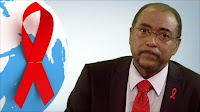
African Women Test Vaginal Ring To Kill HIV Virus
African Institute for Social Development(AISD) has been involved in international efforts to bring about changes and lasting solutions to HIV virus in African Communities and the world. The virus that causes AIDS would not have a vaccine for many more years to come. In the effort to combat the virus, Scientists have been running trials of Microbicides(= substances that kill viruses on contact) which could bring about the lasting changes and prevent many people from become infected during sexual contacts.
We are pleased to publish the new trial that has been launched in June 2010 and will involve women from 7 countries in southern Africa. David Brown from Washington Post wrote the following news report :
By
David BrownWashington Post Staff Writer June 2010
The first test of a long-acting vaginal ring loaded with an HIV-preventing drug has begun enrolling women in southern Africa.
With no prospects for an AIDS vaccine in the next decade or longer, the AIDS community has high hopes for "
microbicides," the general term for substances that kill viruses or bacteria on contact. None of the compounds tested to date, however, has worked, and one of them actually increased a woman's risk of becoming infected.
The new study is the 15
th undertaken by the International Partnership for
Microbicides, a nonprofit group in Silver Spring that has helped lead the search for a discreet, woman-controlled means of protection.
"This is the one that is most likely to work,"
Zeda Rosenberg, the head of the organization, said last week at Women Deliver 2010, an international conference on maternal and child health held in Washington.
Elizabeth
Mataka, the United Nations special envoy for HIV/AIDS in Africa, said she was "very excited about the prospect" of a long-acting
microbicidal ring. She told reporters that its advantage is that "nobody needs to know, nobody needs to agree" when a woman uses it.
Heterosexual intercourse is by far the main mode of HIV transmission in the world, with women at somewhat greater risk than men. Of the 33 million people living with AIDS worldwide, 16 million are women age 15 and older. Two-thirds of HIV-infected people live in sub-Saharan Africa, and 60 percent of them there are women.
The product manufactured by the Silver Spring nonprofit is a silicone ring similar to one used in contraceptive devices such as
NuvaRing. It is impregnated with
dapivirine, an
antiretroviral drug. The drug is released into the vagina over a month, after which it is replaced.
The study is recruiting 280 women and will evaluate the ring's safety through blood tests, pelvic exams and interviews with users. The first women were recruited in South Africa at the end of April; other volunteers will come from three nearby countries.
Whether the ring successfully prevents HIV infection will require a much larger study that won't begin until next year. It will recruit up to 8,000 women in seven countries, will cost about $90 million and is expected to have results in 2015.
Previous studies have shown that a woman's sexual partner is aware that she is using a vaginal ring about half the time. Some experts are worried that if a woman uses the ring without informing a partner, she might risk becoming the victim of violence if he finds out.
"I think women are incredibly resourceful and will figure out how to place this in the context of their relationship," Rosenberg said.
An 889-woman study of a vaginal gel containing the
antiretroviral drug
tenofovir is underway in South Africa. Preliminary results on that
microbicide will be revealed next month.
A vaginal ring that contains both contraceptives and an
antiretroviral drug is also under development with support from the U.S. Agency for International Development, said
Régine Sitruk-Ware, an endocrinologist with the nonprofit Population Council. It would be removed once a month during the menstrual period and could be used for a year
We at AISD encourage members of African Community in the East Midlands region and England to play a part in these developments or at least stay informed. We therefore invite all our readers to join our feedback conference in London:
MICROBICIDES 2010 Conference
‘Building Bridges in HIV Prevention’ Feedback Session
You are cordially invited to the Microbicides 2010 conference feedback session. The session will highlight new studies and findings, key messages and emerging issues presented at the conference in Pittsburgh, USA.
Please find below details for the session
DATE: Friday 2nd July 2010
TIME: 14.00 – 16.00
VENUE: African HIV Policy Network, 3rd Floor West Wing, New City Cloisters, 196 Old Street, London, EC1V 9FR
Please confirm your attendance to the session by email to Mariama.kamara@ahpn.org or call 0207 017 8910 by Wednesday 30th June 2010.








